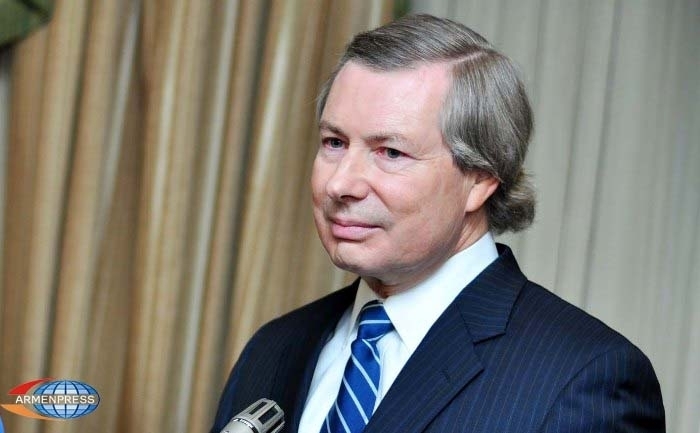James Warlick hopeful that Presidents will accept Hollande's invitation to meet in Paris
 12:59, 24 June 2014
12:59, 24 June 2014YEREVAN, JUNE 24, ARMENPRESS. The United States remains committed to moving this peace process forward, and helping the sides overcome the current impasse as soon as possible. The pace of negotiations is a reflection of that commitment. The U.S. Co-Chairs of the OSCE Minsk Group, Ambassador James Warlick stated this in an exclusive interview to “Armenpress” News Agency.
- During your speech on Karabakh at the Carnegie Endowment for International Peace on 7 May, you outlined 6 principles and elements that form the basis of U.S. policy toward the Minsk Group and the Nagorno-Karabakh conflict. These principles are on the table of negotiations. On which provisions do not the parties (Armenia and Azerbaijan) come to an agreement?
- These principles and elements will serve as the basis of a peace agreement, but there will need to be further negotiations to clarify the details and meet the needs of all stakeholders. Nothing is final until the sides have reached agreement on the whole package. We believe it is important for the Presidents of Armenia and Azerbaijan to meet to discuss these elements and agree to begin negotiations that will lead to the conclusion of a peace agreement.
- You also said: “When such negotiations commence, the parties should not only reconfirm their commitment to the ceasefire but also undertake much-needed and long-sought security confidence-building measures“. What measures did you particularly mean?
- There have been a number of ideas discussed in recent years that would reduce tensions and increase transparency on the border and the Line of Contact, and diminish the likelihood of escalation, whether intentional or accidental. What’s important is that the sides reach agreement on such measures in order to give peace negotiations the best chance of succeeding.
- How do you assess the progress in Track II efforts to build people-to-people contacts between Azerbaijanis and Armenians?
- There has been some good work done in Track II in recent years, but we need more. If we truly want a lasting settlement, we need to increase participation and build relationships among people across the region.
- What is your stand on the full participation of Nagorno Karabakh -as a third party- in the negotiation process
- Any enduring peace agreement must reflect the views of all affected parties if it is to succeed. We travel to Nagorno-Karabakh regularly to consult with the de facto authorities, and will continue working to ensure their voice is heard.
- As a result of continuous violations of Ceasefire by the Azerbaijani Armed forces, Armenian side continues to lose lives of its citizens and soldiers. In some part, these violations are based on the belligerent rhetoric of Azerbaijani authorities. Does Minsk Group format have any leverage to press on Azerbaijani government to end its war speech and to cope with the overall fragility of the ceasefire? The most recent incident was on the border of Nakhchivan which was something new, wasn’t it?
- We continue to call on the sides to reduce actions and rhetoric that could raise tensions or damage the peace process, including violence on the Line of Contact and the international borders. There is no military solution to this conflict, and these kind of provocations only slow progress toward our mutual goal – a peaceful, sustainable settlement that will deliver the security and prosperity that the people of this region deserve.
- What are the next steps foreseen in the Minsk process? When do you plan your next visit to the region?
- I remain hopeful that we can organize another summit in the near future to build on the two presidents’ constructive dialogue in Vienna last November. I look forward to continuing our talks as soon as possible, whether in the region or elsewhere, although we’re still working to schedule our next engagement. We hope that the Presidents will accept French President Hollande’s offer to meet soon in Paris. Swiss President Burkhalter’s call for “structured negotiations” is also an opportunity for the sides to advance the peace process.
- High-ranking meetings have intensified in recent year, how did the peace process benefit from it?
- The United States remains committed to moving this peace process forward, and helping the sides overcome the current impasse as soon as possible. The pace of negotiations is a reflection of that commitment. Along with the Russian and French co-chairs and the Personal Representative of the OSCE Chairman in Office, I have worked to bring new ideas to the table, seek agreement on the path forward, and build support for a peaceful, negotiated settlement. I look forward to continuing these efforts in the months ahead.
Interview by Syune Barseghyan





















